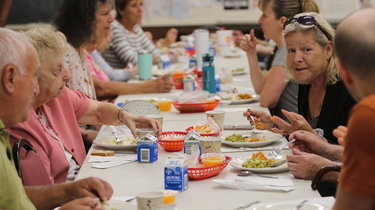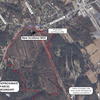Town Board allocates $50K in federal funds toward $120K senior bus
Enterprise file photo — Michael Koff
A new bus would allow for more elderly residents to attend twice-weekly senior lunches, like this one, held at the Wyman Osterhout Community Center in New Salem and also at Saint Matthew’s in Voorheesville, Deb Engel, New Scotland’s senior outreach liaison, told the New Scotland Town Board.
NEW SCOTLAND — Deb Engel, New Scotland’s senior outreach liaison, continues to make the case for a new van to transport the town’s elderly residents.
Transportation of New Scotland’s senior citizens has been at half capacity for the past three years after it was determined repairing one of the town’s two senior buses would be too expensive, which led to the board declaring it surplus and the bus being sold at auction.
Engel told the town board at its Oct. 11 meeting that parts for the remaining 2009 vehicle are hard to find.
“The exhaust system is completely gone,” she said of the 14-year-old vehicle. “I’m just afraid if it breaks down again, we’ll be without one.”
The board had hosted a workshop in May to find out how residents thought the town’s federal American Rescue Plan Act funds, meant to help with fallout from the pandemic, should best be spent.
The town had already earmarked about $324,000 for new playground equipment at its Swift Road and Feura Bush parks — with $125,000 of that to come from a state grant — and another $23,000 from federal funds to streamline the town’s general code.
A handful of New Scotland senior citizens came to the May 10 workshop to ask board members to use some of the remaining funding to purchase a new bus.
Engel told the board then that the pandemic took a terrible toll on all New Scotland residents, but it was the “seniors and the elderly residents in town who were affected immensely.” Engel said, “They were left almost completely vulnerable and alone. They were terrified at the thought of going to the grocery store or coming into contact with the public, [and] becoming very sick.”
Although the “Yellow Bus Trips” organized by Engel had stopped during the pandemic, they started again last spring with outings to various local venues.
Engel told the board a new bus would allow for more elderly residents to attend twice-weekly senior lunches held at the Wyman Osterhout Community Center and Saint Matthew’s in Voorheesville.
Engel also pointed out to board members that New Scotland’s residents aren’t getting any younger.
“According to the latest Census report, seniors are currently the largest population [cohort]” in New Scotland,” Engel said; nearly 38 percent of residents are over the age of 55. “In the town of New Scotland, we all know that the senior numbers are going to continue to grow over the years,” she said.
While all four board members present at the Oct. 11 meeting — Daniel Leinung was absent — sounded empathetic toward the need for a reliable vehicle to transport seniors, there was disagreement over how much money to commit.
“We still have several hundred thousand we can allocate,” said William Hennessy of the federal funds. He said a new van would cost $120,000 and that grants often require a 50-percent match.
Bridgit Burke said that Engel had been working tirelessly to get grants and had been turned down. She said she would like to spend the ARPA funds “to get us to 100 percent.”
In September 2022, the board had passed a resolution allowing the town to accept private donations to help pay for the uncovered portion of a grant Engel was applying for at the time; the award would have been for 80 percent of the new bus’s cost, about $90,000.
Engel said at the Oct. 11 meeting that, in addition to donations from individuals, that the charitable Kara’s Closet in Voorheesville has also raised funds for the bus.
Hennessy said the federal funds don’t have to be allocated until the end of 2024 and he wasn’t sure he wanted to allocate the full $100,000.
“I think we should at least make a resolution to dedicate $50,000,” Burke said of the ARPA funds.
Supervisor Douglas LaGrange asked Albany County legislator Vicky Plotsky, who was in the gallery, if the county’s committee allocating its ARPA funds would look favorably on the town paying for half the cost of a van.
Plotsky said that would definitely be helpful but added, “There’s a lot of demand on the county funds.”
Plotsky also suggested that, since the town knows a van would have to be replaced 10 years down the road, it should reserve funds ahead for the purchase.
LaGrange said that, with some grants, if the town were to buy the bus before receiving the grant money, it would not get the grant.
Engel said that Deputy Supervisor Adam Greenberg had helped her write a letter to state Senator Neil Breslin, requesting funds.
Greenberg said he wanted to hear back from Breslin before voting to allocate $100,000 because he thought there was a good chance of getting state funds, but he was “happy to go with $50,000 now.”
Ultimately, all four board members vote to spend $50,000 of the ARPA funds on a senior van.
After the vote, a resident seated in the gallery suggested the town put up a pole barn to shelter a new van. “Sun eats fiberglass roofs,” he said.
Hilton Barn
Progress is being made on access to the Hilton Barn and getting sewer and water lines to it so that bathrooms can be installed.
In 2016, the town saved the massive post-and-beam barn — it’s 60 feet wide, 60 feet tall, and 120 feet long — when it was slated for demolition to make way for a housing development. Joseph Hilton had Frank Osterhout build the barn on his New Scotland farm in 1898.
The barn was moved across Route 85A from its original location and is now surrounded by parkland, which is adjacent to Albany County’s popular Helderberg-Hudson Rail Trail.
On Oct. 11, the town board agreed to pay Creighton Manning Engineering $3,600 for a driveway permit required by the state’s Department of Transportation.
Hennessy said he had hoped the current driveway could be considered “grandfathered” in but the DOT said it was too narrow for a park, and a permit would be needed.
Hennessy also reported that the installation of new siding has started on the barn’s first floor. The original plan, Hennessy said, was to leave the original siding on the second floor and stain it but, in testing the second-floor siding, he said, “they could see deterioration.”
“It’s 125 years old,” said Greenberg.
Architects are looking at a preliminary quote, Hennessy said. “It could still be done this year … We do have ARPA funding available,” said Hennessy.
In a separate matter, Greenberg said, “We’re trying to get water to the barn so there are bathrooms and facilities.”
The board considered the two quotes that LaGrange said had been received by Commissioner of Public Works William West: $12,500 from Vadney and $9,850 from Ram Excavation.
“He’s waiting for one or two other bids,” said Greenberg, suggesting that the board’s motion be made to go with a lower bid if one materializes. That is what the board ultimately agreed to: to not exceed $9,850 for connecting lines from Hilton Road to the barn.
Finally, the board heard a question on the Hilton Barn from the gallery. Peter Drao, who ran unsuccessfully in 2022 for a seat on the town board and is running again this year, both times on the GOP ticket, asked, “Is there an issue with termites in the barn?”
“We’ve never encountered those — only bees,” responded Hennessy.
“And a lot of pigeons,” chimed in Highway Superintendent Kenneth Guyer.
Other business
In other business at its Oct. 11 meeting, the New Scotland Town Board:
— Heard from Greenberg that the town’s in-house part-time planner is retiring at the end of November. He said the post would be advertised and interviews conducted;
— Approved the name “Cramer Lane” for a private road off of Krumkill;
— Approved Mark McFarland as a member of the Onesquethaw Volunteer Fire Company;
— Approved a request from Court Clerk Stacy Loucks to apply for a Justice Court Assistance Program grant for up to $30,000. “Power to them,” said Hennessy; and
— Received a report from Loucks that in August justices David Wukitsch and Robert Johnson received 67 charges — 64 involved Vehicle and Traffic Law — and disposed of 92 charges of which 85 involved Vehicle and Traffic Law.
Altogether, $9,724 were collected in fines ($6,818), surcharges ($2,656), and civil fees ($250).



